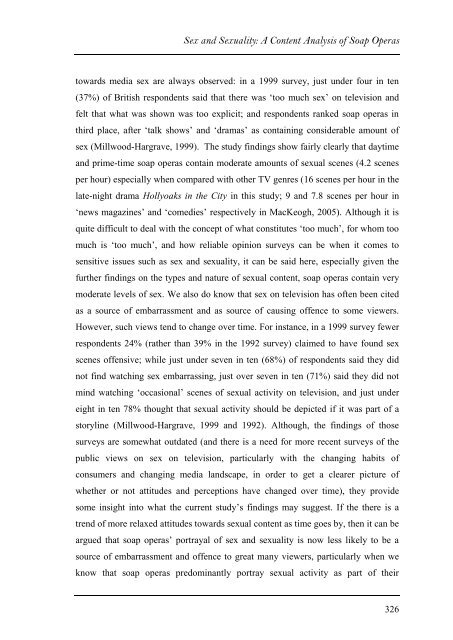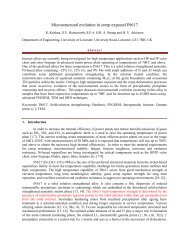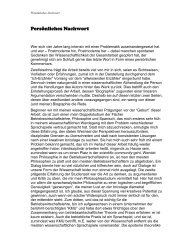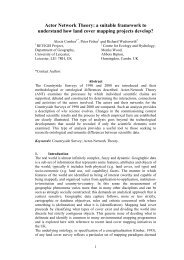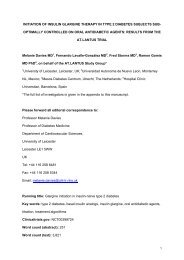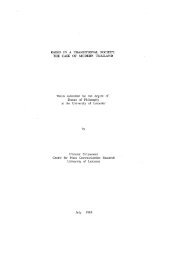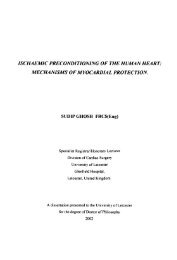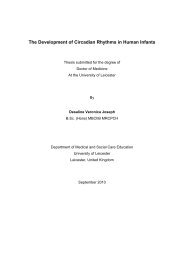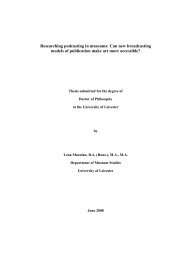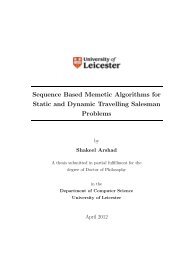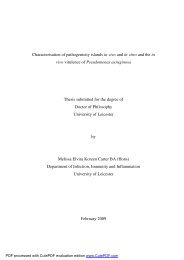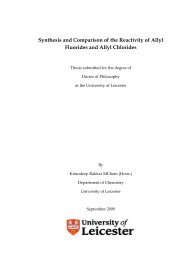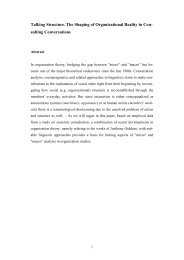- Page 1 and 2:
Sex and Sexuality: A Content Analys
- Page 3 and 4:
Abstract Over the last decade soap
- Page 5 and 6:
Sex and Sexuality: A Content Analys
- Page 7 and 8:
Sex and Sexuality: A Content Analys
- Page 9 and 10:
Sex and Sexuality: A Content Analys
- Page 11 and 12:
Sex and Sexuality: A Content Analys
- Page 13 and 14:
Sex and Sexuality: A Content Analys
- Page 15 and 16:
Sex and Sexuality: A Content Analys
- Page 17 and 18:
Sex and Sexuality: A Content Analys
- Page 19 and 20:
Sex and Sexuality: A Content Analys
- Page 21 and 22:
Sex and Sexuality: A Content Analys
- Page 23 and 24:
Sex and Sexuality: A Content Analys
- Page 25 and 26:
Sex and Sexuality: A Content Analys
- Page 27 and 28:
Sex and Sexuality: A Content Analys
- Page 29 and 30:
Sex and Sexuality: A Content Analys
- Page 31 and 32:
Sex and Sexuality: A Content Analys
- Page 33 and 34:
Sex and Sexuality: A Content Analys
- Page 35 and 36:
Sex and Sexuality: A Content Analys
- Page 37 and 38:
Sex and Sexuality: A Content Analys
- Page 39 and 40:
Sex and Sexuality: A Content Analys
- Page 41 and 42:
Sex and Sexuality: A Content Analys
- Page 43 and 44:
Sex and Sexuality: A Content Analys
- Page 45 and 46:
Sex and Sexuality: A Content Analys
- Page 47 and 48:
Sex and Sexuality: A Content Analys
- Page 49 and 50:
Sex and Sexuality: A Content Analys
- Page 51 and 52:
Sex and Sexuality: A Content Analys
- Page 53 and 54:
Sex and Sexuality: A Content Analys
- Page 55 and 56:
Sex and Sexuality: A Content Analys
- Page 57 and 58:
Sex and Sexuality: A Content Analys
- Page 59 and 60:
Sex and Sexuality: A Content Analys
- Page 61 and 62:
Sex and Sexuality: A Content Analys
- Page 63 and 64:
Sex and Sexuality: A Content Analys
- Page 65 and 66:
Sex and Sexuality: A Content Analys
- Page 67 and 68:
Sex and Sexuality: A Content Analys
- Page 69 and 70:
Sex and Sexuality: A Content Analys
- Page 71 and 72:
Sex and Sexuality: A Content Analys
- Page 73 and 74:
Sex and Sexuality: A Content Analys
- Page 75 and 76:
Sex and Sexuality: A Content Analys
- Page 77 and 78:
Sex and Sexuality: A Content Analys
- Page 79 and 80:
Sex and Sexuality: A Content Analys
- Page 81 and 82:
Sex and Sexuality: A Content Analys
- Page 83 and 84:
Sex and Sexuality: A Content Analys
- Page 85 and 86:
Sex and Sexuality: A Content Analys
- Page 87 and 88:
Sex and Sexuality: A Content Analys
- Page 89 and 90:
Sex and Sexuality: A Content Analys
- Page 91 and 92:
Sex and Sexuality: A Content Analys
- Page 93 and 94:
Introduction Sex and Sexuality: A C
- Page 95 and 96:
Sex and Sexuality: A Content Analys
- Page 97 and 98:
Sex and Sexuality: A Content Analys
- Page 99 and 100:
Sex and Sexuality: A Content Analys
- Page 101 and 102:
Sex and Sexuality: A Content Analys
- Page 103 and 104:
Sex and Sexuality: A Content Analys
- Page 105 and 106:
Sex and Sexuality: A Content Analys
- Page 107 and 108:
Sex and Sexuality: A Content Analys
- Page 109 and 110:
Sex and Sexuality: A Content Analys
- Page 111 and 112:
Sex and Sexuality: A Content Analys
- Page 113 and 114:
3.2.2.5 Home and Away Sex and Sexua
- Page 115 and 116:
Sex and Sexuality: A Content Analys
- Page 117 and 118:
Sex and Sexuality: A Content Analys
- Page 119 and 120:
Sex and Sexuality: A Content Analys
- Page 121 and 122:
4. Talk toward sex (intimate/ seduc
- Page 123 and 124:
Sex and Sexuality: A Content Analys
- Page 125 and 126:
Sex and Sexuality: A Content Analys
- Page 127 and 128:
Sex and Sexuality: A Content Analys
- Page 129 and 130:
Sex and Sexuality: A Content Analys
- Page 131 and 132:
Sex and Sexuality: A Content Analys
- Page 133 and 134:
Sex and Sexuality: A Content Analys
- Page 135 and 136:
2. Provide satisfaction for partner
- Page 137 and 138:
Sex and Sexuality: A Content Analys
- Page 139 and 140:
Sex and Sexuality: A Content Analys
- Page 141 and 142:
Sex and Sexuality: A Content Analys
- Page 143 and 144:
Sex and Sexuality: A Content Analys
- Page 145 and 146:
Sex and Sexuality: A Content Analys
- Page 147 and 148:
Sex and Sexuality: A Content Analys
- Page 149 and 150:
Sex and Sexuality: A Content Analys
- Page 151 and 152:
BOX (4-1) Sex and Sexuality: A Cont
- Page 153 and 154:
Type of Sexual Talk Comments about
- Page 155 and 156:
Sex and Sexuality: A Content Analys
- Page 157 and 158:
Sex and Sexuality: A Content Analys
- Page 159 and 160:
Sex and Sexuality: A Content Analys
- Page 161 and 162:
Sex and Sexuality: A Content Analys
- Page 163 and 164:
Sex and Sexuality: A Content Analys
- Page 165 and 166:
Sex and Sexuality: A Content Analys
- Page 167 and 168:
Sex and Sexuality: A Content Analys
- Page 169 and 170:
Sex and Sexuality: A Content Analys
- Page 171 and 172:
Sex and Sexuality: A Content Analys
- Page 173 and 174:
Sex and Sexuality: A Content Analys
- Page 175 and 176:
Sex and Sexuality: A Content Analys
- Page 177 and 178:
Sex and Sexuality: A Content Analys
- Page 179 and 180:
Sex and Sexuality: A Content Analys
- Page 181 and 182:
Sex and Sexuality: A Content Analys
- Page 183 and 184:
Sex and Sexuality: A Content Analys
- Page 185 and 186:
Sex and Sexuality: A Content Analys
- Page 187 and 188:
4.3 Summary and Discussion Sex and
- Page 189 and 190:
Sex and Sexuality: A Content Analys
- Page 191 and 192:
Sex and Sexuality: A Content Analys
- Page 193 and 194:
Sex and Sexuality: A Content Analys
- Page 195 and 196:
Sex and Sexuality: A Content Analys
- Page 197 and 198:
Sex and Sexuality: A Content Analys
- Page 199 and 200:
Sex and Sexuality: A Content Analys
- Page 201 and 202:
Sex and Sexuality: A Content Analys
- Page 203 and 204:
Sex and Sexuality: A Content Analys
- Page 205 and 206:
Sex and Sexuality: A Content Analys
- Page 207 and 208:
Sex and Sexuality: A Content Analys
- Page 209 and 210:
Sex and Sexuality: A Content Analys
- Page 211 and 212:
Sex and Sexuality: A Content Analys
- Page 213 and 214:
Sex and Sexuality: A Content Analys
- Page 215 and 216:
Sex and Sexuality: A Content Analys
- Page 217 and 218:
Sex and Sexuality: A Content Analys
- Page 219 and 220:
Sex and Sexuality: A Content Analys
- Page 221 and 222:
Sex and Sexuality: A Content Analys
- Page 223 and 224:
Sex and Sexuality: A Content Analys
- Page 225 and 226:
Sex and Sexuality: A Content Analys
- Page 227 and 228:
Sex and Sexuality: A Content Analys
- Page 229 and 230:
Sex and Sexuality: A Content Analys
- Page 231 and 232:
Sex and Sexuality: A Content Analys
- Page 233 and 234:
Sex and Sexuality: A Content Analys
- Page 235 and 236:
6.2.2 Ethnicity Sex and Sexuality:
- Page 237 and 238:
6.2.3 Age Sex and Sexuality: A Cont
- Page 239 and 240:
Age Child (Up to 12 years) Teenager
- Page 241 and 242:
Sex and Sexuality: A Content Analys
- Page 243 and 244:
Sex and Sexuality: A Content Analys
- Page 245 and 246:
Sex and Sexuality: A Content Analys
- Page 247 and 248:
Sex and Sexuality: A Content Analys
- Page 249 and 250:
Sex and Sexuality: A Content Analys
- Page 251 and 252:
Sex and Sexuality: A Content Analys
- Page 253 and 254:
Sex and Sexuality: A Content Analys
- Page 255 and 256:
Sex and Sexuality: A Content Analys
- Page 257 and 258:
Sex and Sexuality: A Content Analys
- Page 259 and 260:
Sex and Sexuality: A Content Analys
- Page 261 and 262:
Sex and Sexuality: A Content Analys
- Page 263 and 264:
Sex and Sexuality: A Content Analys
- Page 265 and 266:
Sex and Sexuality: A Content Analys
- Page 267 and 268:
Sex and Sexuality: A Content Analys
- Page 269 and 270:
Sex and Sexuality: A Content Analys
- Page 271 and 272:
Sex and Sexuality: A Content Analys
- Page 273 and 274:
Sex and Sexuality: A Content Analys
- Page 275 and 276:
Sex and Sexuality: A Content Analys
- Page 277 and 278:
Sex and Sexuality: A Content Analys
- Page 279 and 280:
Sex and Sexuality: A Content Analys
- Page 281 and 282:
Sex and Sexuality: A Content Analys
- Page 283 and 284:
Sex and Sexuality: A Content Analys
- Page 285 and 286: Sex and Sexuality: A Content Analys
- Page 287 and 288: Sex and Sexuality: A Content Analys
- Page 289 and 290: Sex and Sexuality: A Content Analys
- Page 291 and 292: Scene [1] At the café, where Irene
- Page 293 and 294: Sex and Sexuality: A Content Analys
- Page 295 and 296: Sex and Sexuality: A Content Analys
- Page 297 and 298: Sex and Sexuality: A Content Analys
- Page 299 and 300: Sex and Sexuality: A Content Analys
- Page 301 and 302: Sex and Sexuality: A Content Analys
- Page 303 and 304: Sex and Sexuality: A Content Analys
- Page 305 and 306: Sex and Sexuality: A Content Analys
- Page 307 and 308: Sex and Sexuality: A Content Analys
- Page 309 and 310: Sex and Sexuality: A Content Analys
- Page 311 and 312: Sex and Sexuality: A Content Analys
- Page 313 and 314: Sex and Sexuality: A Content Analys
- Page 315 and 316: Sex and Sexuality: A Content Analys
- Page 317 and 318: Sex and Sexuality: A Content Analys
- Page 319 and 320: Sex and Sexuality: A Content Analys
- Page 321 and 322: Sex and Sexuality: A Content Analys
- Page 323 and 324: Sex and Sexuality: A Content Analys
- Page 325 and 326: Sex and Sexuality: A Content Analys
- Page 327 and 328: Sex and Sexuality: A Content Analys
- Page 329 and 330: Homosexuality Sex and Sexuality: A
- Page 331 and 332: Sex and Sexuality: A Content Analys
- Page 333 and 334: Sex and Sexuality: A Content Analys
- Page 335: Sex and Sexuality: A Content Analys
- Page 339 and 340: Sex and Sexuality: A Content Analys
- Page 341 and 342: Sex and Sexuality: A Content Analys
- Page 343 and 344: Sex and Sexuality: A Content Analys
- Page 345 and 346: Sex and Sexuality: A Content Analys
- Page 347 and 348: Sex and Sexuality: A Content Analys
- Page 349 and 350: Sex and Sexuality: A Content Analys
- Page 351 and 352: Sex and Sexuality: A Content Analys
- Page 353 and 354: Sex and Sexuality: A Content Analys
- Page 355 and 356: Sex and Sexuality: A Content Analys
- Page 357 and 358: 1 Chapter Four: Tables Soap Operas
- Page 359 and 360: Sex and Sexuality: A Content Analys
- Page 361 and 362: 2 Chapter Five: Tables Soap Operas
- Page 363 and 364: 3 Chapter Six: Tables Type of Sexua
- Page 365 and 366: Nature of Sexual Activity in Scene
- Page 367 and 368: Nature of Sexual Activity in Scene
- Page 369 and 370: Character's Sexual Orientation Hete
- Page 371 and 372: Character's Relationship Status Cha
- Page 373: 4 Chapter Seven: Tables Type of Ref


